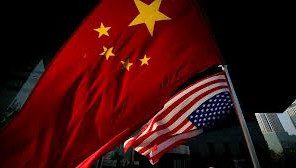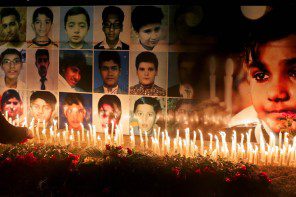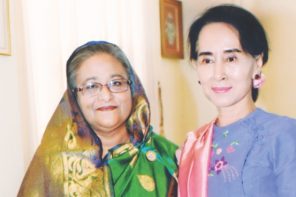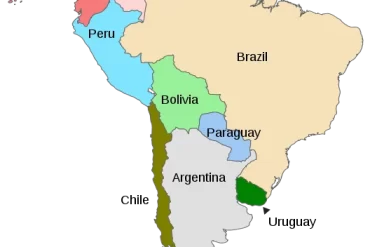This article is being written during a time period during which everyone wonders how the escalation between Russia and Turkey is going to end. The Turkish shooting down of a Russian plane has obviously angered Putin, which presumably will lead to the disappearance or at least softening of the self-proclaimed ‘world leader’ discourse of Erdoğan in the long-term. Nevertheless, in the coming future, the further authoritarianisation of Turkey seems inevitable, and the ‘other half’ of the Turkish society teeters on the edge of letting themselves be absorbed into the second wave of political apathy in their country by trying to make yourself not care about the unbelievablenesses of the current situation in the country and minding your own business… as much as they can.
Ignorance on its own is not dangerous. It becomes dangerous however, when it is subject to organization. The Justice and Development Party (AKP) of Recep Tayyip Erdoğan previously claimed that they are “no longer wearing the Islamist shirt”, but they were instead pro-liberalisation and guiding Turkey’s path towards European Union membership. A remarkable proportion of the Turkish population found this self-marketing believable and trustworthy, and thus they presented them with the gift of a single-party government.
The year was 2002, now we are about to say goodbye to 2015, and in the past decade and a couple of years, Erdoğan-led pseudo-Western concessions-made-Islamist government has already proved itself ‘wrong’ and authoritarian many times over. The difference between these two points in time, though, if we may compare them, is that now the institutional and discursive power of the Islamist rule in Turkey, personified by Erdoğan, has become irreversible.
The official discourse of Erdoğan ─ which is based upon an explicit hate speech towards
women, Jews, Armenians and other minorities, LGBT people, Alawites, atheists, Christians,
in short, anyone but religious Turkish male Sunni Muslims who support AKP ─ has
not been paying off well. The climate in the society has grown increasingly polarised thanks to an official discursive culture of hatred fed to the average people of Turkish society. The increasing authoritarianism of the AKP government and hatred and discrimination-based discourse of Erdoğan has unfortunately created an Islamic dictatorship in the place of a problematic yet promisingly-progressing democracy in Turkey.
The Turkish society was able to politically and actively exist and make itslf heard during the Gezi Park protests, or resistance, two years ago, which emerged as a social uprising against the government’s intentions to build a mall in the place of the one of the last remaining public parks of poor Istanbul. The initial small-scale protest evolved and expanded drastically, in the form of an #occupy movement, and ended up as, if I may, the only democratic 15 days in Turkish history. Turks, Kurds, women, men, LGBT people, Turkish nationalists, Armenians, socialists and liberals… long story short, every sane person who was a member of the society was there. Protesting for their rights, and more importantly, for the rights of nature. However, in the end, the political vibe failed to be administered well, arguably owing to the lack of leadership possibly caused by the extremely democratic atmosphere. The movement could not be allowed to evolve into a higher-politically existent and strong voice. Thus, Erdoğan gained even more power, and consolidated his one-manship a step further.
Just a couple of months ago, an arguably relevant, or legitimately irrelevant political voice has
emerged in Turkey: the HDP, the Peoples’ Democratic Party. Having its core and origin in the Kurdish political movement, it successfully ‘united’ the diverse politics under one umbrella party. In this regard, I consider(ed) the HDP as the contemporary Turkish equivalent of the Green parties in Western Europe.
They have managed to acquire large-scale support from diverse ideological orientations and ethnic identities present within Turkish society, and they managed to get into the parliament gaining 13% of the votes: Within the political system, by the way, a party needs to pass the 10% electoral threshold, a fact that surely speaks for itself. HDP received an enormous amount and quality of support even from people who used the word ‘Kurd’ as an insult. If the Gezi Park movements were the first possible revolutionary democratization attempt in Turkey, HDP ‘between the two elections’ was the second.
Everyone was happy. Finally, the Turkish people reached the point in the history of their republic where there would once again be diverse rule. However, things did not work out as hoped, which by the way, was nothing else or more than the ethical, fair processing of the political preferences in Turkey. In the atmosphere, the AKP, who recently lost the everlasting capability to form a single-party government, had to find a coalition partner… They couldn’t find one. Thus, a more dictatorial and effective solution was needed for the re-election.
As a result of that intention, Erdoğan basically started a war. Despite the fact that there was a truce at that time, he reintroduced the war between the Kurdish armed separatists and the Turkish state. The tactic of dirty politics worked well and unfortunately and they regained the support of the not-so-bright swing citizens in the country, as well as managing to re-re-re-demonize the reputation of the Kurdish people, not only their political movement, e.g. gave speeches disrespectfully holding the killed soldiers’ coffins, in an attempt at emotional manipulation, and explicitly stated on the television that “it would not be like this, if the people elected them as a single-party government in the first place”.
Then, last month, the re-election took place. The AKP has now somehow managed to increase its votes back to 50% back again. Somehow.
When we look at the statements made right after everyone knew, or were supposed to know,
the most-certainly-concrete results of the elections, without even deconstructing the rhetoric
of them, it seems to the bare eye that all other political parties, and thus their leaders, were
already persuaded about the results. The HDP was in the parliament against all odds, the odds
being the almost-totalitarian 10% electoral threshold, so they had better be happy, the CHP somehow managed to get the same amount of votes that they became used to in the past decades, and the MHP, which disappointed everyone through not accepting the coalition
offers by any party, managed to lose votes, but was still in the parliament.
From today’s perspective, it is fair to assume that Erdoğan is most likely going to become the president, a post which does not yet exist in Turkey yet. Moreover, such a position is nothing more than a well-marketed mask for the entitlements of a sultan. It is similar to how a minister of war is now called a minister of defense, or an expansion is now called an enlargement, or an oligarch is now called an entrepreneur. As long, though, as the West needs Erdoğan to stop the ‘uncivilized’─ the Russian proof or the many others which explicitly provide thorough evidence of Erdoğan’s government’s ─ even ‘Erdoğan state’s involvement in Syria and support for the Islamic State, will be ignored.
There are reasons that I am a deeply-rooted realist. Until a couple of years ago, Erdoğan was thought to be a pro-EU democrat, both in Turkey and abroad. Then he was no longer considered as such, owing to, or at least, during Gezi. Now, recently, before the last elections, Merkel paid a visit to Erdoğan, offering him a free of charge high-quality marketing campaign.
Some might call it hypocrisy. I call it reality.
Realpolitik. “Wir schaffen das,” indeed, Frau Bundeskanzlerin, everyone schafft das, as long as they bribe someone with 3 billion euros.
No dictator in history just left because they were asked to leave. They were deposed as a result of their expected death or an extensive struggle.
In the aftermath of repeatedly failing to persuade Turkish people to wage war against Assad in Syria, still today, Erdoğan’s aspirations still consist of a Turkish role in the Syrian conflict, thus convincing Turkish people that he is becoming more and more successful in realizing the neo-Ottomanist delusion, remains intact.
In conclusion, the recent re-elections in Turkey were not fair at all. The results were designated. This particular piece might now be regarded as a speculative opinion piece, owing to the deep establishment of the objectivity fetishism of the totalitarian Eurocentric academic doctrine. However, at some point in the future, it is most likely going to be regarded as a revolutionary intellectual piece just because it said things before the perpetrators confessed them, after the Dictator fell. No harm done. We know the truth. And the truth fortunately does not get determined via democracy.
As I just called it. Not hypocrisy. Reality.
The writer is a Post Graduate Student of Global Studies, at University of Vienna, Austria.






